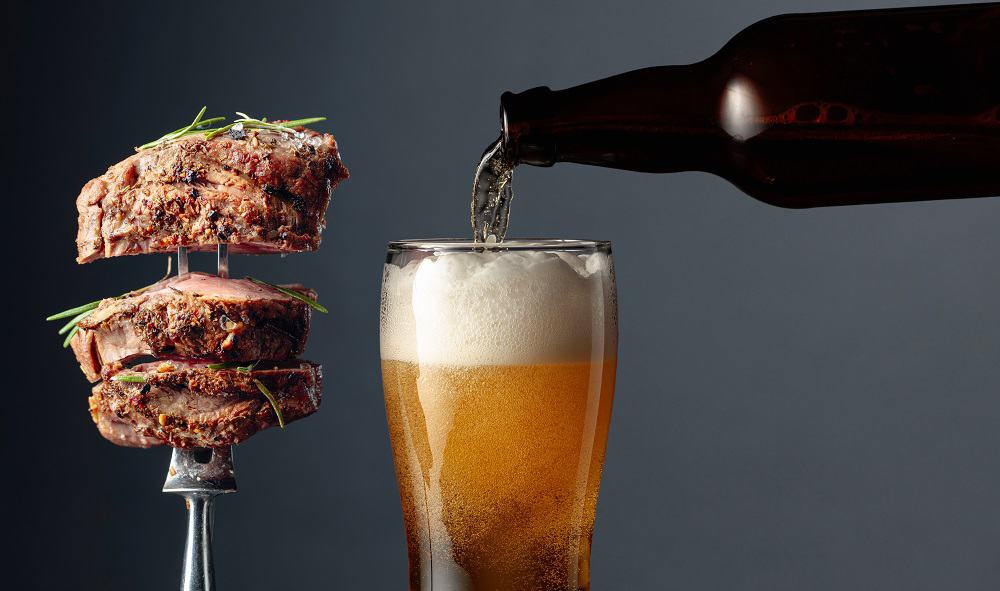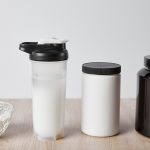
Though it may seem counterintuitive, certain studies have shown that individuals with a particular inclination towards exercise and otherwise taking up athletic training can also have a certain proclivity towards alcohol consumption, especially in comparison to their peers.
However, it is likely that they only continue to do so because they are unaware of the effects excessive alcohol consumption can have on muscle building, protein synthesis, and general bodily function pertaining to athletic endeavors or exercise.
Alcohol has been demonstrated to cause a significant impact to not only the protein synthesis taking place within an exerciser’s body but also a host of other effects that can dampen or slow down the development of one’s musculature and other physiologic athletic functions, making its consumption detrimental to general health and capacity for exercise.
What is Protein Synthesis?
The biochemical process of protein synthesis refers to an organism producing amino acids through certain pathways classified beneath transcription, translation and post translation.

At a larger and more fitness focused level, protein synthesis is a blanket term that encompasses the body’s ability to initiate and complete repairs of muscle fibers damaged during intense bouts of exercise, such as in the case of resistance training or sprinting.
This particular effect occurs post-exercise for up to two days, and generally requires that the individual support its function by way of proper rest and diet so as to maximize the total physiological growth and protein synthesis that is gained.
The process of protein synthesis is highly complex, and will usually begin at extracellular stimuli brought on by a bout of exercise – of which is otherwise known as a hypertrophy stimulus, with the opposite effect being known as an atrophy stimulus.
When sufficient hypertrophic stimulus is induced in the skeletal muscles, subsequent recovery will begin with the Phosphoinositide 3 kinase pathway, prior to proceeding to the now upregulated AKT and mTOR pathway, initiating the function of several protein signal enzymes and thereby instigating muscle protein synthesis at a cellular level.
How Does Alcohol Affect Akt/mTOR?
Though rather niche in application, a variety of studies from multiple differing sources have managed to identify a rather concerning side effect of ethanol alcohol consumption – that is, a night of heavy drinking appears to have significant detrimental effects to the protein synthesis of skeletal muscle cells.
The exact mechanism of this muscle protein synthesis decrease is in the initiation of protein synthesis translation, especially in the case of phosphorylation towards eukaryotic translation initiation factor binding proteins.
One among these altered or dampened protein synthesis pathways is that of mTOR, of which also requires sufficient phosphorylation when functioning at a basal level.
As such, in simpler terms, alcohol appeared to have a direct chemical, enzymatic and hormonal impact on skeletal muscle growth induced from hypertrophic stimulus such as what Cone would accrue from proper exercise.
Why is Protein Synthesis Important to Athletes and Bodybuilders?
The term anabolic has become synonymous with the sort of fitness supplements and workout routines one would find high level athletes and bodybuilders making use of on a day to day basis.
However, the term anabolism is in fact simply another word for protein synthesis – and in this particular context, that of skeletal muscle protein synthesis, usually stimulated by exercise so as to cause hypertrophic growth of one’s musculature.
When a bodybuilder or athlete completes their exercise routine, small tears and other forms of damage will have collected along the fibers of their skeletal muscles, an entirely ordinary consequence of intense training that is nothing to be alarmed about.
It is these microscopic instances of damage that are the main reason muscle protein synthesis is so important for bodybuilders and athletes, as subsequent repair or muscular hypertrophy requires the presence and nominal function of said muscle protein synthesis in order to be possible.
Should Bodybuilders and Athletes Drink Alcohol?
As can be surmised from the previous section of this article, it is best for bodybuilders and athletes to entirely avoid the consumption of alcohol, especially if they do not or cannot retain a moderate level of consumption.
Bright Future Recovery goes on to say that this is in combination with a host of other factors are detrimental to physiological function and growth as a consequence of regular or excessive ethanol alcohol absorption, such as increased cortisol levels, impacted hepatic system function, altered neurological function and a difficulty in dieting due to the amount of calories in most alcoholic beverages.
Entirely abstaining from drinking alcohol is one way for an athlete or bodybuilder to maximize the possible muscle growth they can achieve – but this is not to say that any consumption of alcohol will entirely ruin the benefits of their training earlier in the day.
Generally, one or two drinks a few times a week should have negligible to no impact on a bodybuilder or athlete’s performance and training, especially if every other aspect of their fitness is in check, such as intaking a sufficient enough volume of protein and training in the correct manner.
Can Drinking Protein Supplements Counteract Alcohol’s Effects on Protein Synthesis?
While alcohol doubtless can play a significant role in the function of muscle protein synthesis and its ability to repair muscle fiber damage in a post exercise capacity, the primary building blocks of such a process are in the shape of amino acids, building blocks that make up a large portion of the cellular structures found in the skeletal musculature.
The primary way many bodybuilders, athletes and regular gym goers receive their required intake of protein is through the consumption of protein rich foods as a major portion of their diet – though it is also considered common practice to make use of protein supplements such as powdered branch chain amino acid supplements and whey protein shakes so as to provide the body with sufficient protein synthesis materials.
Despite this, however, the mechanism at which alcohol may impact or alter protein synthesis is only tangentially related to the macronutrient intake of the individual, and as such increasing their protein intake or altering what sort of protein source they are consuming will not have a very significant impact on alcohol’s protein synthesis effects.
This, of course, is not applicable in the case of an individual who is already suffering from a lack of macro nutritive protein or amino acids, as such a condition is only worsened by the various catabolic and hormonal effects of alcohol consumption.
How Should an Athlete or Bodybuilder Train While Maintaining Their Drinking Habits?
What can be inferred from the research and studies made into the particular effects of an impacted level of muscle protein synthesis is that athletes or bodybuilders should generally avoid alcohol in order to maximize their training gains.
However, if said athlete or bodybuilder instead wishes to continue their ordinary consumption of alcohol despite this detriment to their fitness, it is best for them to plan their workout intensity and volume around days where they intend to drink or events where they will be consuming excess amounts of alcohol so as to minimize its impact on their training.
To do so, it is advisable for the athlete or bodybuilder to generally choose lower volume workouts that make use of a lower level of resistance than they would normally perform – in short, less intense workouts for days where their recovery may be impaired by the effects of alcohol consumption.
When is the Best Time to Drink Alcohol for Bodybuilders?
Generally, in terms of optimal muscle protein synthesis as a route of recovery post-workout, it is best for bodybuilders or similar athletically inclined individuals to drink the day after a workout or athletic event, wherein the muscle protein synthesis is already partially complete and no longer at a highly elevated level.
If speaking in terms of hours instead, it is most advisable to instead consume alcoholic beverages after a workout for the obvious reason that performing intense exercise while inebriated can be quite dangerous, placing more at risk than just one’s protein synthesis capacity.
References
- Barnes, M.J., Mündel, T. & Stannard, S.R. Post-exercise alcohol ingestion exacerbates eccentric-exercise induced losses in performance. Eur J Appl Physiol 108, 1009–1014 (2010). https://doi.org/10.1007/s00421-009-1311-3
- Laufenberg, L.J.; Crowell, K.T.; Lang, C.H. Alcohol Acutely Antagonizes Refeeding-Induced Alterations in the Rag GTPase-Ragulator Complex in Skeletal Muscle. Nutrients 2021, 13, 1236. https://doi.org/10.3390/nu13041236
- Lang, C.H., Pruznak, A.M., Deshpande, N., Palopoli, M.M., Frost, R.A. and Vary, T.C. (2004), Alcohol Intoxication Impairs Phosphorylation of S6K1 and S6 in Skeletal Muscle Independently of Ethanol Metabolism. Alcoholism: Clinical and Experimental Research, 28: 1758-1767. https://doi.org/10.1097/01.ALC.0000145787.66405.59
- GF-I/IGFBP-3 ameliorates alterations in protein synthesis, eIF4E availability, and myostatin in alcohol-fed rats Charles H. Lang, Robert A. Frost, Elisabeth Svanberg, and Thomas C. Vary American Journal of Physiology-Endocrinology and Metabolism 2004 286:6, E916-E926
- Vary, T.C., Nairn, A.C. and Lang, C.H. (2004), Restoration of Protein Synthesis in Heart and Skeletal Muscle After Withdrawal of Alcohol. Alcoholism: Clinical and Experimental Research, 28: 517-525. https://doi.org/10.1097/01.ALC.0000121653.80502.54







